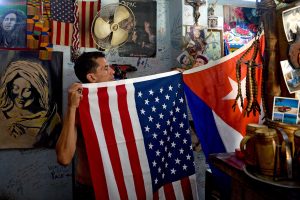By: Andres Chinchilla, 2L
On September 23, 2020, the Trump Administration imposed new sanctions against the Cuban government. These sanctions restrict U.S. travelers from, among other things, importing Cuban cigars or staying in government-owned hotels. This new policy follows recent restrictions by the Trump Administration targeting U.S. travel to Cuba. Such travel restrictions include the banning of cruise ships, private boats, fishing vessels, group educational trips, etc. from travelling to Cuba from the U.S. This move is part of the Trump Administration’s efforts to diminish U.S. ties with the Castro regime and condemn the regime for its human rights violations and support of an oppressive Venezuelan government.
Since Fidel Castro assumed control of Cuba in 1959, the U.S. and Cuba have had a tumultuous relationship, riddled with tension. President John F. Kennedy initiated the U.S. stance against Cuba through hefty economic sanctions and travel restrictions. It was not until 2008 that the Obama Administration made attempts to enhance diplomatic relations with Cuba by lifting certain restrictions, permitting Cuban American travel, and opening up a dialogue with the Castro regime. This was the first instance where the U.S. had taken significant strides to reduce its grip on the Cuban economy and utilize diplomacy over hostility.
Today, it is still contentious as to whether lifting some, or all, restrictions are a good idea. After all, Castro’s rise to power drove hundreds of thousands of families out of the country and directly caused the death of over 9,000 Cubans through the use of firing squads, torture, and preventing citizens from fleeing. The Trump Administration cites these atrocities, along with other contemporary human rights issues, as a basis for maintaining a strong embargo against Cuba. Moreover, these restrictions come as a result of Cuba’s role in bolstering the Venezuelan government’s economic and political status under the Maduro regime. Nonetheless, some argue that these policies are simply ineffective and outdated given the progress of the Castro regime. Those in opposition point to Cuba’s widespread poverty and link current U.S. sanctions as a primary cause.
For many, especially Cuban Americans, it will be difficult to put aside their animosity toward the Cuban government—at least to the extent that it changes their stance on foreign policy. That is not to say that the reparation of this long-lasting, adversarial relationship is beyond reach. The U.S. has certainly come a long way since the Cold War era in loosening its grasp on the Castro regime, and the regime has taken some steps in the right direction. However, the question still remains as to when we can expect a full release, and when such steps would be appropriate.





